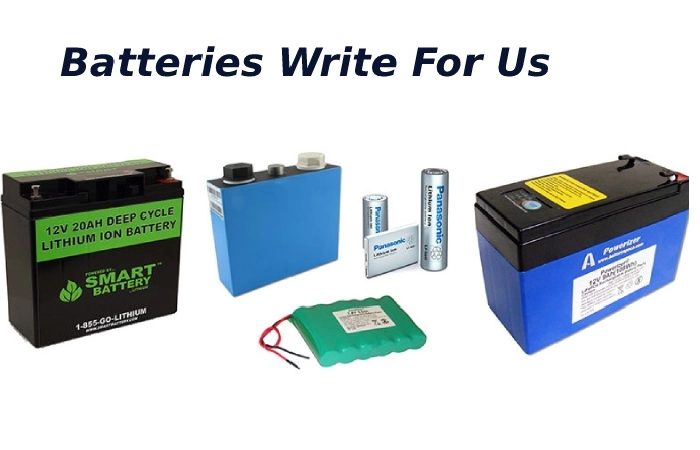
We LOVE The Dedicated, Driven, And Passionate tech Writers to share their battery knowledge with our customers.
As a contributing writer for Techwadia.com, you will motivate and educate other engineers, DIY starters etc, to find the best battery information. Our writers give our readers engaging content that is factual and trustworthy.
Interested In Contributing?
Please email contact@techwadia.com. Include writing samples and list some ideas you want to share with our readers. We will reach out as soon as possible if you catch our eye.
Batteries Write For Us
The batteries store electrical energy in a chemical form and then release it as a controlled continuous current.
All types of batteries contain a positive electrode and a negative one submerged in an electrolyte, and the complete set is inside a container.
Most batteries are lead-acid, which means they have positive and negative electrodes formed by lead compounds in an electrolyte of diluted sulfuric acid. To write for us, you can send us an email at contact@techwadia.com
Lead-acid batteries are secondary batteries, meaning they can recharge after downloading.
Primary batteries, such as radio and flashlight batteries, can be downloaded only once, and then you have to discard them.
How do the batteries work?
The positive electrode comprises lead dioxide and the negative of porous lead.
When an electric charge (for example, the headlights or a starter engine) is connected through the battery, a current circulates through the battery electrolyte and the external load. It causes the battery to be downloaded, transforming both electrodes’ chemical composition into lead sulfate.
To recharge the battery, you have to pass a current through it from an external source of electricity, such as an alternator, a dynamo, or a load unit. In this way, lead sulfate transforms again into the original materials: lead dioxide and porous lead.
As the battery is loaded, electricity begins to decompose (hydrolyz) the water from the electrolyte in its constituent, hydrogen and oxygen elements, which are released as gas. For this reason, the batteries release
when they are loaded.
Battery types
Depending on the use that it is put to, and at a general level, they could be separated into the following classes:
Stationary batteries
- For non-battery-intensive applications with deep discharges, that would Quickly Deplete Battery Life.
- Deep cycle batteries
- Batteries Suitable for the Full Range of Medium-Sized Electric Vehicles, Such as Wheelchairs, Golf Carts, Mini Electric Motorcycles, Quads, and Even some Caravans, Boats, or Cars
Starter batteries
- Engines are started or started using batteries.
- Generally, starters and motor starters require a lot of current in a short period.
- To maximize surface area, starting batteries include plenty of thin plates.
Are all batteries the same?
No, we can find many types of batteries, and all of them have the primary function of storing electricity to supply it when needed. Due to their different compositions and internal configurations, we can find batteries that are much more suitable than others for different uses.
It is essential to know which battery is suitable for the use that we are going to give it, since otherwise we can waste the particular characteristics of the product or exhaust the useful life of our battery in a few days due to improper use, remember that even on the external batteries are similar or even share general specifications such as voltage and amperage, they will not give you the expected result if you do not choose the right type of battery.
How to Submit Your Articles?
That is to says, to submit your article at www.techwadia.com, mail us at contact@techwadia.com
Why Write for Techwadia – Batteries Write for Us

- Writing for Techwadia can expose your website to customers looking for Coding Bootcamp.
- Techwadia’s presence is on social media, and we will share your article with the Batteries related audience.
- You can reach out to us at contact@techwadia.com
Search Terms Related to Batteries Write for Us
Power
Charge
Energy
Voltage
Capacity
Rechargeable
Lithium
Alkaline
Nickel
Cadmium
Lead-acid
Cell
Acid
Electrochemical
Portable
Duracell
Energizer
Storage
Hybrid
Solar
Electric
Car
Recycling
Chemistry
Ion
Anode
Cathode
Zinc
Mercury
Sodium
Magnesium
Manganese
Polymer
Carbon
Nickel-metal hydride
Nickel-cadmium
Primary
Secondary
Fuel cell
Chemical
Discharge
Ampere-hour
Milliampere-hour
Cycle life
Separator
Separator film
Supercapacitor
Solid-state
Graphene
Nanotechnology
Search Terms for Batteries Write for Us
Batteries Write for Us
Write for Us Batteries
Batteries Guest Post
Guest Post Batteries
Batteries Contribute
Contribute Batteries
Batteries Submit Post
Submit Post Batteries
Batteries submit an article
Submit an article Batteries
Batteries become a guest blogger
A guest blogger Batteries
Batteries writers wanted
Wanted writers Batteries
Batteries suggest a post
Suggest a post Batteries
Batteries guest author
Guest author Batteries
Article Guidelines on techwadia – Batteries Write for Us
- We at techwadia welcomes fresh and unique content related to Coding Bootcamp.
- Techwadia allow a minimum of 500+ words related to Coding Bootcamp.
- The editorial team of techwadia does not encourage promotional content related to Coding Bootcamp.
- For publishing article at techwadia email us at contact@techwadia.com
- Techwadia allows articles related to Technology, Tech Talks, Gadgets, Innovation, Start Ups, Apps, Marketing, Business and many more.

